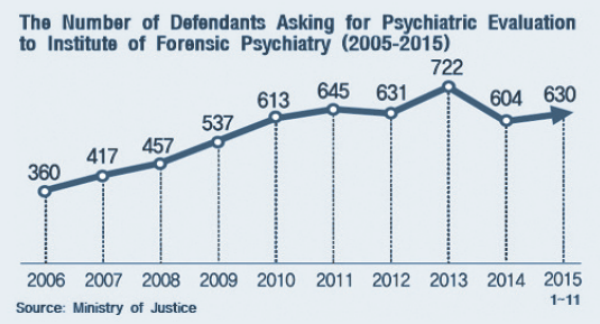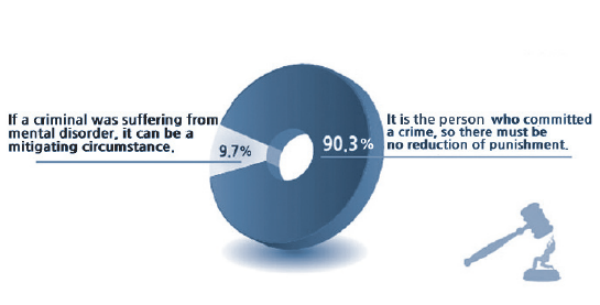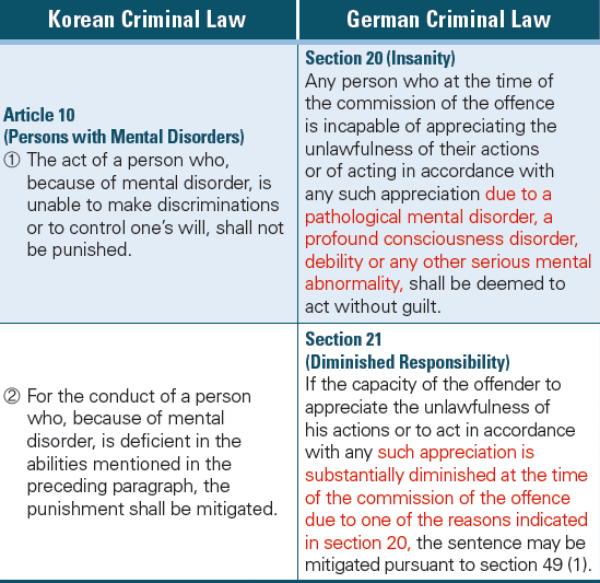In March, 2017, the whole country was horrified by the case where a 17-year-old girl kidnapped and killed an eight-year-old girl in Incheon. It turned out that the teenage murderer was suffering from schizophrenia. She is expecting a reduction in punishment for this reason, her legal team using Article 10 of Criminal Law as a way to reduce her punishment. This case, like many precedents did in history, has caused controversy as to whether Article 10 for the mentally incompetent is a reasonable law or not. The Sungkyun Times (SKT) informs Kingos about Article 10, of its background, problems, and potential new approach.
Background of Article 10 of Criminal Law
Definition of Mental Incompetence in Law
According to the National Law Information Center, mental incompetence refers to a condition where a person lacks the ability of distinction and control of one’s will due to a mental illness. Legally, there are two decisive factors, which are biological factors and psychological factors. Biological factors include mental disorders such as neurasthenia, alcoholism, or slight dyskinesia. According to circumstances, cerebral palsy or schizophrenia can also be included. In contrast, psychological factors mean the ability to make discriminations and to control one’s will. Not only congenital illnesses but also acquired ones caused by drink or drugs can be regarded as a reason for commutation, if the criminal was proved to have a mental disorder at the crime scene. When considering these factors, mental incompetence is inevitably specified as a condition in a person who receives mitigating circumstance in Article 10 of Criminal Law. What it means is that judges have no authority to decide whether to mitigate punishment or not.
| Article 10 (Persons with Mental Disorders) ① The act of a person who, because of mental disorder, is unable to make discriminations or to control one’s will, shall not be punished. ② For the conduct of a person who, because of mental disorder, is deficient in the abilities mentioned in the preceding paragraph, the punishment shall be mitigated. ③ The provisions of the preceding two paragraphs shall not apply to the act of one who, in anticipation of danger of a crime, has intentionally incurred one’s mental disorder. |
Background of the Introduction of Article 10
Article 10 was introduced based on the provision of law in Germany and Japan. Fundamentally, the law is based on liability, which is one of basic principles of modern criminal law. This shows that those who have the ability to make discriminations and control their wills are punishable. This law is supposed to guarantee the equality and the human rights of people with mental disorders.
Problems of Reducing Punishment for the Mentally Incompetent
Ambiguous Criteria
Firstly, the grounds for biological and psychological factors which decide mental incompetence are unclear. That is, it is difficult for them to be applied to some cases if a defendant’s ability of distinction or decision-making is worsened due to psychological defect at the moment of committing a crime.
When the theories of criminal law were introduced to Korea from countries like Germany or Japan, understanding toward the criteria of classifying the mentally incompetent was not enough. On the other hand, German criminal law specifies types of mental illness and has a detailed article for people with mental disorders due to drink or drugs. The article of the Korean criminal law in question, however, simply deals with mental disorders without specified symptoms. Therefore, judges tend to reach a verdict by just following precedents. Moreover, especially in the case of the accused with mental disorders who have been arrested due to drink or drugs, judges reach a verdict based on unclear criteria such as the drinking capacity of a defendant. This leads to a lack of objectivity because each person has a different drinking capacity.
Additionally, because of ambiguous criteria, judges mostly use medical opinions just as subordinate evidence. In other words, the verdict is not necessarily constrained to follow medical opinions but to follow legal decisions of judges in principle.
Possibility of Abusing the Law
There is possibility that criminals can abuse Article 10 since the criteria is unclear and wide-ranging. Indeed, more and more defendants charged with felonies ask for psychiatric evaluation, claiming that they are legally mentally incompetent. Since there are precedents of commutation due to mental disorders, they can abuse the law, regarding it as an all or nothing chance. For instance, according to research conducted by the Ministry of Justice, the number of defendants asking for psychiatric evaluation turned out to have doubled for the last 10 years from 2005 to 2015. This alludes to the fact that criminals might become unafraid of receiving punishment. Furthermore, Article 10 needs to be more specific regarding crime prevention. According to analysis by the Supreme Prosecutors’ Office in 2015, about 50% of murderers and 31.5% of sex offenders had mental disorders. Although not all criminals receive light punishment, a high percentage of criminals with mental disorders indicates that there is a high possibility of mentally incompetent people committing crimes.

Against the Public Sentiment
One of the biggest problems of Article 10 is that, although there were criminals who had committed heinous crimes that shocked everyone, their punishments imposed on them were not severe. Therefore, backlash from the public became strong. Examples presented below are two controversial cases that indicate this problem.
1. The Cho Doo-Soon Case in 2008
In 2008, there was an incident in which an eight-year-old girl was kidnapped on her way to school and raped by 57-year-old Cho Doo-Soon, who was drunk at the time. Although this shocking case sparked huge outrage in Korea, Cho appealed to the court that he was drunk when committing the crime. Later, his protestation was accepted, and he was sentenced to jail just for 12 years. According to the law, he could have been sentenced to life for rape and assault. The judge, however, took the mitigating circumstances into consideration, admitting that Cho was suffering from alcoholism and he was too drunk to clean his blood-stained clothes. This verdict aroused a strong anger and protests among citizens, including the parents of the victim. People started to question whether people with mental disorders deserve commutation or not. Indeed, according to a survey conducted by NICE R&C in 2012, 90.3% of people disagreed with Article 10 allowing mentally incompetent people to receive a softer punishment. Later, reflecting the negative public opinion, a special regulation was established, stating that “Sexual assaults caused by mentally incompetent criminals through drink or drugs should not be the reason to apply Article 10.”

2. Gangnam Murder Case in 2016
Last year, there was a terrible incident that occurred at a public toilet in Seocho-gu. A 34-year-old man stabbed a woman he had never met before, and later stated that he committed murder due to his hatred toward women. After that, the police investigated his medical records and announced that the incident was driven by mental disorder. The judge sentenced him to jail for 30 years, considering that he was suffering from schizophrenia and was isolated from society. Public opinion, however, went completely against the verdict, insisting that Article 10 for people with mental disorders worked as an ‘indulgence.’
Some stated that the article was introduced to consider people with mental disorders but actually turned out to be harmful to society. Public opinion became so negative that some people even started to regard people with mental disorders as potential criminals. Regarding this phenomenon, legal experts claimed that punishing people with mental disorders should be prudently discussed and seriously implemented before public opinion becomes even more negative.

Potential Approaches
Concretizing Article 10
Article 10 needs to be more specific as it can similarly be found in German criminal law, so it can clarify which symptoms of mental disorders should be included and which shouldn’t. Specific provision of criminal law will prevent the court from subjectively judging whether a defendant has a mental disorder or not.

Moreover, even though a defendant might satisfy both biological and psychological factors of a mental disorder, the article needs to embrace various perspectives such as psychology or psychoanalysis. In this way, criminals will no longer belittle punishment or expect commutation based on the excuse of mental disorder. People with mental disorders based on alcohol or drugs would receive punishment according to the revised article, which will prevent criminals from abusing the law for the sake of a reduction in punishment.
Improving the Legal Structure
If the process of judging mental incompetence is improved, society would be able to expect reasonable verdicts reflecting various points of view. The way the current system works is that, if the court accepts a defendant’s statement and presumes that he or she has a mental disorder, it can only ask for psychiatric evaluation. This is different from the systems of France and Germany in that they specify prosecutors and defendants, and each court has the right to ask for psychiatric evaluation. In this way, France and Germany regard psychiatric evaluation as one of the core factors for the verdict. In Korea, however, the court regards the process of psychiatric evaluation as subordinate evidence which increases the possibility of subjective and short-sighted verdict by the court.
Therefore, this legal system needs to be improved upon and embrace various aspects such as psychiatry or forensic medicine. For example, if medical specialists unanimously agree on whether a defendant has a mental disorder or not, the court needs to respect their opinions as a critical factor for verdicts. Meanwhile, Article 10 also needs to be specified in more detail. As in the United Kingdom or the United States, types of psychiatric evaluation which defendants should take according to the types of crimes they commit must be concretely stated. As the current system has only two methods that have never been changed, it not only falls behind in the improvement of criminal psychiatry but also lacks effectiveness as a criterion for verdicts. Therefore, as the National Police have announced that it is going to cooperate with psychiatrists from this year and plan to organize taskforces to control people with mental disorders, the Korean law structure needs to be more cooperative with various other organizations.
Article 10, introduced to guarantee the human rights of people with mental disorders, will remain controversial as it has included violent offenders that have shocked society. It is time for people to think about how Article 10 can be a threat to human dignity, even though it was introduced to offer equality at first. If various aspects including legal and psychological points of view cooperate to supplement the defects of Article 10, it will eventually be a ‘good law’ that leads to more concrete verdicts and greater equality within the Korean legal system.
